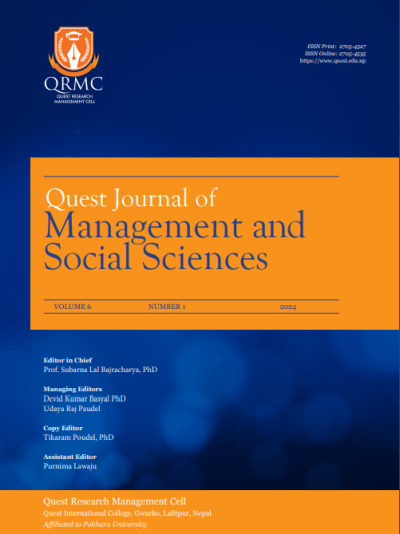Attitudes of the General Public towards Corporate Social Responsibility in Nepal: The Influence of Gender and Generation
DOI:
https://doi.org/10.3126/qjmss.v6i1.67239Keywords:
Corporate Social Responsibility, Attitude towards CSR, Generation, Gender, NepalAbstract
Background: Despite the increasing concerns about corporate social responsibility (CSR) among academicians and corporate managers, there is a lack of studies regarding the general public's attitudes towards CSR in Nepal. No previous studies in the Nepalese context have examined the influence of demographic factors, including gender and generation, on attitudes toward CSR.
Objectives: The paper aims to identify the general public's attitudes towards CSR in Nepal and examine the differences in attitudes toward CSR by gender and generation.
Methods: The study employed a questionnaire survey method by taking a sample of 212 general public, including males and females from Generation X, Generation Y, and Generation Z. Descriptive statistics, one-way-ANOVA, and t-tests were used to analyse the collected data.
Results: Although the general public of Nepal demonstrates above-average agreement on the four different business responsibilities towards society, they believe that the philanthropic responsibility of business is most important, followed by legal, economic, and ethical responsibilities. The t-tests and One-Way ANOVA tests show no statistically significant differences in attitudes toward CSR based on gender and generation, indicating that the demographic factors do not significantly influence participants' attitudes towards economic, legal, ethical, and philanthropic responsibilities of business towards society.
Conclusion: The results show that Nepal's general public perceives philanthropic responsibilities as the most important. The findings also indicate that gender and generation do not influence people's attitudes towards CSR.
Implications: The results suggest that business organisations in Nepal should consider all economic, legal, ethical, and philanthropic responsibilities while designing and implementing CSR strategies to get favourable evaluations of their CSR practices from the general public regardless of gender and generation. However, philanthropic and legal CSR can be given more priority over economic and ethical CSR.
Paper Type: Research paper
JEL Classification: M14
Downloads
Downloads
Published
How to Cite
Issue
Section
License
Copyright (c) 2024 Quest Journal of Management and Social Sciences

This work is licensed under a Creative Commons Attribution-NonCommercial-NoDerivatives 4.0 International License.
This license enables reusers to copy and distribute the material in any medium or format in unadapted form only, for noncommercial purposes only, and only so long as attribution is given to the creator.




